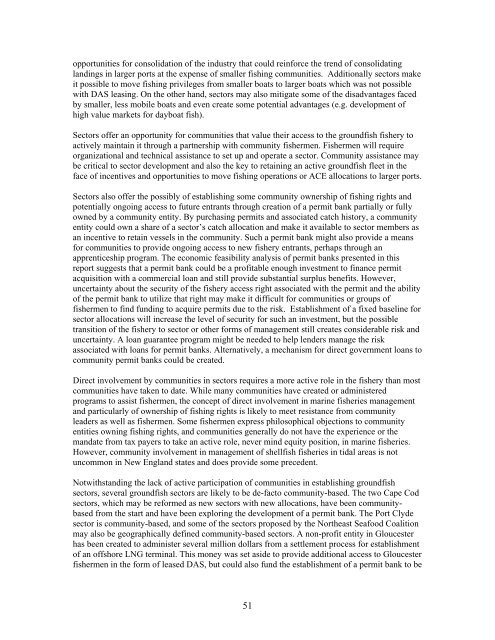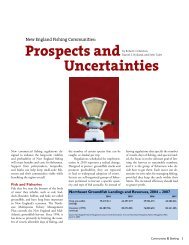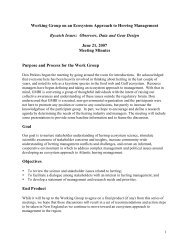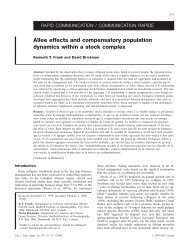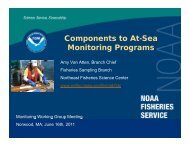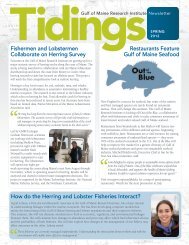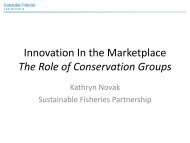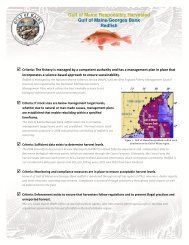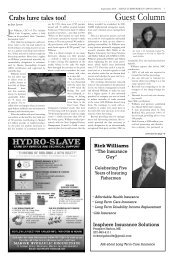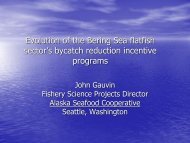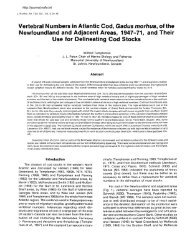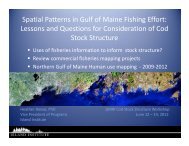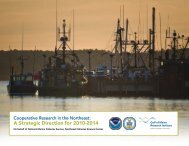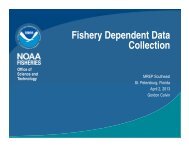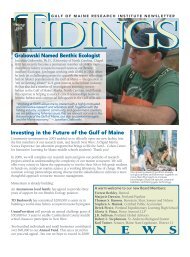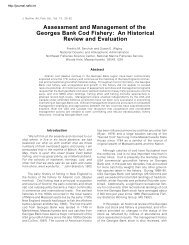Community-based Sectors for the New England Groundfish Fishery
Community-based Sectors for the New England Groundfish Fishery
Community-based Sectors for the New England Groundfish Fishery
Create successful ePaper yourself
Turn your PDF publications into a flip-book with our unique Google optimized e-Paper software.
opportunities <strong>for</strong> consolidation of <strong>the</strong> industry that could rein<strong>for</strong>ce <strong>the</strong> trend of consolidating<br />
landings in larger ports at <strong>the</strong> expense of smaller fishing communities. Additionally sectors make<br />
it possible to move fishing privileges from smaller boats to larger boats which was not possible<br />
with DAS leasing. On <strong>the</strong> o<strong>the</strong>r hand, sectors may also mitigate some of <strong>the</strong> disadvantages faced<br />
by smaller, less mobile boats and even create some potential advantages (e.g. development of<br />
high value markets <strong>for</strong> dayboat fish).<br />
<strong>Sectors</strong> offer an opportunity <strong>for</strong> communities that value <strong>the</strong>ir access to <strong>the</strong> groundfish fishery to<br />
actively maintain it through a partnership with community fishermen. Fishermen will require<br />
organizational and technical assistance to set up and operate a sector. <strong>Community</strong> assistance may<br />
be critical to sector development and also <strong>the</strong> key to retaining an active groundfish fleet in <strong>the</strong><br />
face of incentives and opportunities to move fishing operations or ACE allocations to larger ports.<br />
<strong>Sectors</strong> also offer <strong>the</strong> possibly of establishing some community ownership of fishing rights and<br />
potentially ongoing access to future entrants through creation of a permit bank partially or fully<br />
owned by a community entity. By purchasing permits and associated catch history, a community<br />
entity could own a share of a sector’s catch allocation and make it available to sector members as<br />
an incentive to retain vessels in <strong>the</strong> community. Such a permit bank might also provide a means<br />
<strong>for</strong> communities to provide ongoing access to new fishery entrants, perhaps through an<br />
apprenticeship program. The economic feasibility analysis of permit banks presented in this<br />
report suggests that a permit bank could be a profitable enough investment to finance permit<br />
acquisition with a commercial loan and still provide substantial surplus benefits. However,<br />
uncertainty about <strong>the</strong> security of <strong>the</strong> fishery access right associated with <strong>the</strong> permit and <strong>the</strong> ability<br />
of <strong>the</strong> permit bank to utilize that right may make it difficult <strong>for</strong> communities or groups of<br />
fishermen to find funding to acquire permits due to <strong>the</strong> risk. Establishment of a fixed baseline <strong>for</strong><br />
sector allocations will increase <strong>the</strong> level of security <strong>for</strong> such an investment, but <strong>the</strong> possible<br />
transition of <strong>the</strong> fishery to sector or o<strong>the</strong>r <strong>for</strong>ms of management still creates considerable risk and<br />
uncertainty. A loan guarantee program might be needed to help lenders manage <strong>the</strong> risk<br />
associated with loans <strong>for</strong> permit banks. Alternatively, a mechanism <strong>for</strong> direct government loans to<br />
community permit banks could be created.<br />
Direct involvement by communities in sectors requires a more active role in <strong>the</strong> fishery than most<br />
communities have taken to date. While many communities have created or administered<br />
programs to assist fishermen, <strong>the</strong> concept of direct involvement in marine fisheries management<br />
and particularly of ownership of fishing rights is likely to meet resistance from community<br />
leaders as well as fishermen. Some fishermen express philosophical objections to community<br />
entities owning fishing rights, and communities generally do not have <strong>the</strong> experience or <strong>the</strong><br />
mandate from tax payers to take an active role, never mind equity position, in marine fisheries.<br />
However, community involvement in management of shellfish fisheries in tidal areas is not<br />
uncommon in <strong>New</strong> <strong>England</strong> states and does provide some precedent.<br />
Notwithstanding <strong>the</strong> lack of active participation of communities in establishing groundfish<br />
sectors, several groundfish sectors are likely to be de-facto community-<strong>based</strong>. The two Cape Cod<br />
sectors, which may be re<strong>for</strong>med as new sectors with new allocations, have been community<strong>based</strong><br />
from <strong>the</strong> start and have been exploring <strong>the</strong> development of a permit bank. The Port Clyde<br />
sector is community-<strong>based</strong>, and some of <strong>the</strong> sectors proposed by <strong>the</strong> Nor<strong>the</strong>ast Seafood Coalition<br />
may also be geographically defined community-<strong>based</strong> sectors. A non-profit entity in Gloucester<br />
has been created to administer several million dollars from a settlement process <strong>for</strong> establishment<br />
of an offshore LNG terminal. This money was set aside to provide additional access to Gloucester<br />
fishermen in <strong>the</strong> <strong>for</strong>m of leased DAS, but could also fund <strong>the</strong> establishment of a permit bank to be<br />
51


